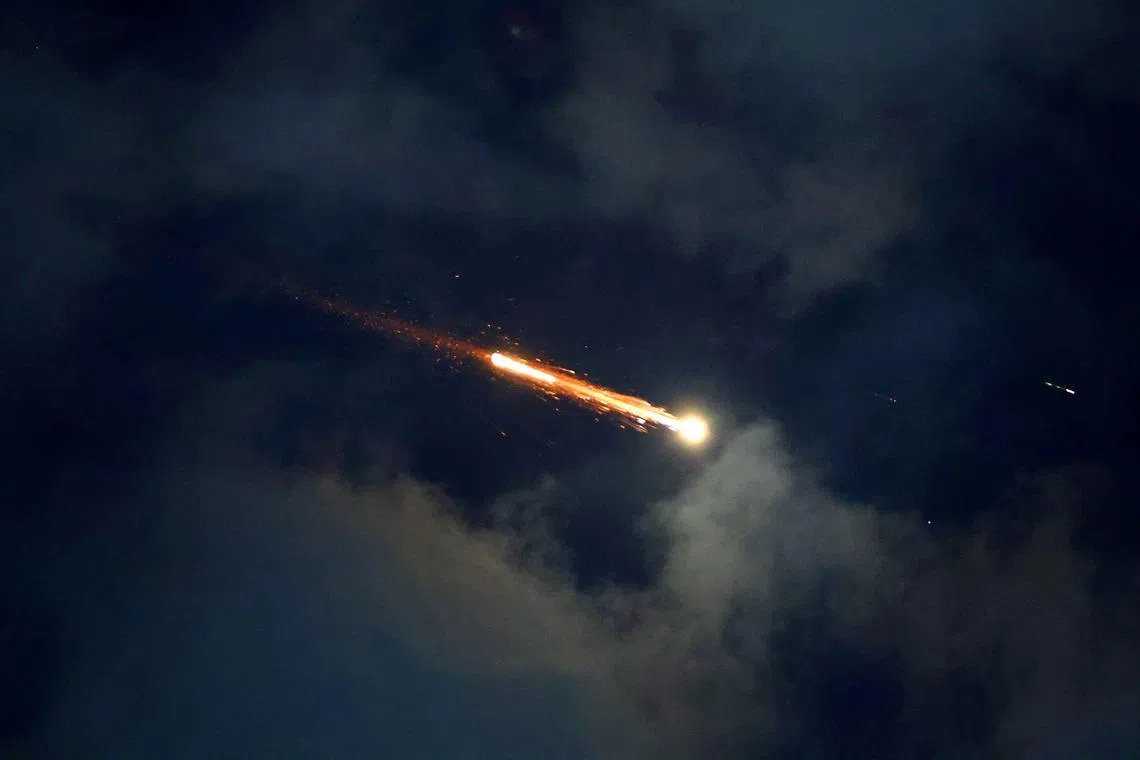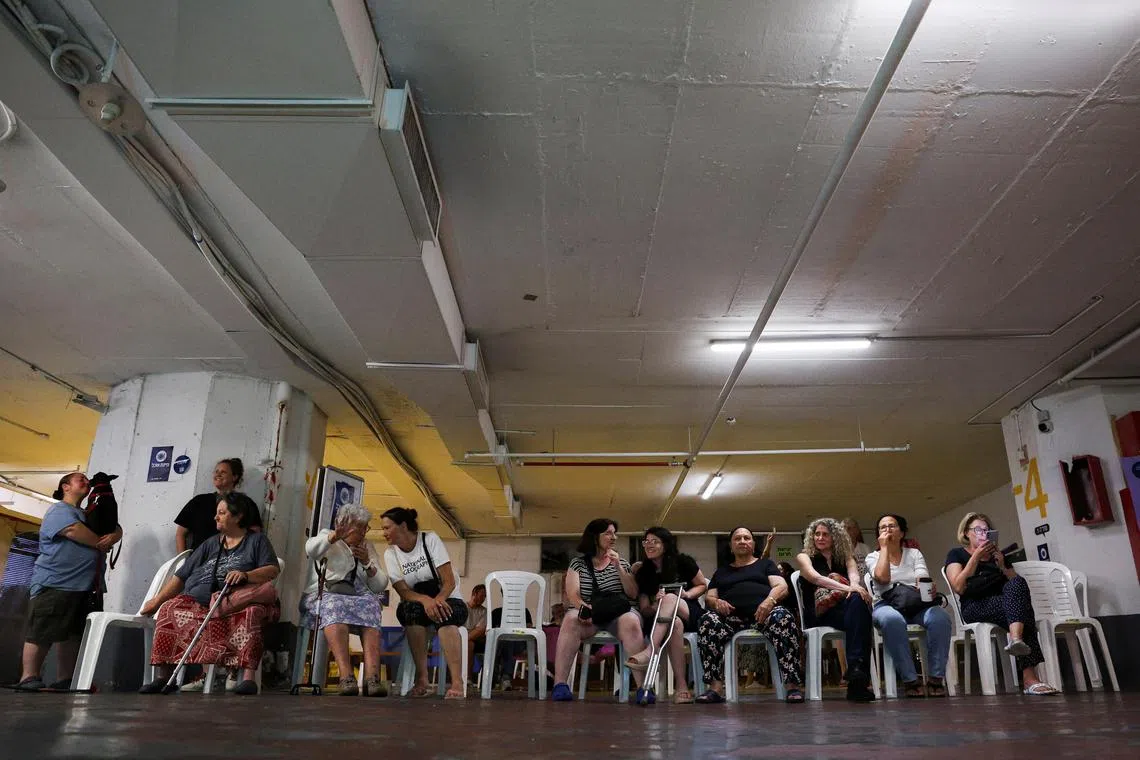Iran threatens ‘more devastating’ response to Israel’s attacks
Sign up now: Get ST's newsletters delivered to your inbox

Rocket trails are seen in the sky above the Israeli coastal city of Netanya, amid a fresh barrage of Iranian missile attacks on June 21.
PHOTO: AFP
TEHRAN - Iran’s President Masoud Pezeshkian warned on June 21 of a “more devastating” retaliation should Israel’s nine-day bombing campaign continue, saying the Islamic republic would not halt its nuclear programme “under any circumstances”.
Israel said on June 21 it had killed three more Iranian commanders in its unprecedented offensive, and Foreign Minister Gideon Saar claimed Tehran’s alleged progress towards a nuclear weapon had been set back by two years.
“We will do everything that we can do there in order to remove this threat,” Mr Saar told the German newspaper Bild, adding that Israel would keep up its onslaught.
Israel and Iran have traded wave after wave of devastating strikes since Israel launched its aerial campaign
On June 21, Israel said it had attacked Iran’s Isfahan nuclear site for a second time, with the UN nuclear watchdog reporting that a centrifuge manufacturing workshop had been hit.
Later on June 21, Iran’s Mehr news agency said Israel had launched strikes on the southern city of Shiraz, which hosts military bases.
And early on June 22, Iran’s Revolutionary Guard announced that a “vast” wave of “suicide drones” had been launched against “strategic targets” across Israel.
Iran denies seeking an atomic bomb, and on June 21 President Pezeshkian said its right to pursue a civilian nuclear programme “cannot be taken away... by threats or war”.
‘Not prepared to negotiate’
In a phone call with French President Emmanuel Macron, Mr Pezeshkian said Iran was “ready to discuss and cooperate to build confidence in the field of peaceful nuclear activities”.
“However, we do not agree to reduce nuclear activities to zero under any circumstances,” he added, according to Iran’s official IRNA news agency.
Referring to the Israeli attacks, he said: “Our response to the continued aggression of the Zionist regime will be more devastating.”
Iran’s armed forces threatened to strike shipments of military aid to Israel “from any country”.
Israel’s main arms supplier is the United States, whose President Donald Trump warned on June 20 that Tehran had a “maximum” of two weeks
Iranian Foreign Minister Abbas Araghchi was in Istanbul on June 21 for a meeting of the Organisation of Islamic Cooperation to discuss the conflict.
Top diplomats from Britain, France and Germany met Mr Araghchi in Geneva
But Mr Araghchi said on June 21: “Iran is ready to consider diplomacy once again, and once aggression is stopped and the aggressor is held accountable for the crimes committed.”
“We’re not prepared to negotiate with them (the Americans) anymore, as long as the aggression continues”.

People waiting in an underground parking lot amid an attack by Iran, in Tel Aviv, Israel, on June 21.
PHOTO: REUTERS
Hundreds killed
Mr Trump, dismissive of European diplomatic efforts, said he was unlikely to ask Israel to stop its attacks to get Iran back to the table.
“If somebody’s winning, it’s a little bit harder to do,” he said, of Israel’s campaign.
Any US involvement would likely feature powerful bunker-busting bombs
US B-2 stealth bombers capable of carrying bunker busters were flying across the Pacific
Iran’s Houthi allies in Yemen on June 21 threatened to resume their attacks on US vessels in the Red Sea if Washington joined the war, despite a recent ceasefire agreement.
The US-based Human Rights Activists News Agency said on June 20 that, based on its sources and media reports, at least 657 people had been killed in Iran, including 263 civilians.
Iran’s health ministry on June 21 gave a toll of more than 400 people killed and 3,056 in the Israeli strikes.
Iran’s retaliatory strikes have killed at least 25 people in Israel, according to official figures.
The Israeli military said it had launched a fresh wave of strikes on June 21 in the area of southern Iran’s Bandar Abbas, targeting drone storage sites and a weapons facility.
Iran’s Tasnim news agency said air defences were activated in the area.
Overnight, Iran said it had targeted central Israel with drones and missiles. Israeli rescuers said there were no casualties after an Iranian drone struck a residential building.
On the Mediterranean island of Cyprus, Israel said June 21 that an Iranian terror plot targeting Israeli citizens
‘Tired’
Israel’s National Public Diplomacy Directorate said more than 450 missiles had been fired at the country so far, along with about 400 drones.
In Tel Aviv, where residents have faced regular Iranian strikes for nine days, some expressed growing fatigue under the constant threat from Iran.
The streets of Tehran, meanwhile, were still largely quiet on June 21, though a few cafes and restaurants were open.
In the afternoon, supporters of the government gathered briefly in front of the headquarters of state television to wave Iranian, Palestinian and Hezbollah flags to a soundtrack of electronic music whose lyrics called for the “death of Israel”.
Western powers have repeatedly expressed concerns about the expansion of Iran’s nuclear programme, questioning in particular the country’s accelerated uranium enrichment.
International Atomic Energy Agency chief Rafael Grossi has said Iran is the only country without nuclear weapons to enrich uranium to 60 per cent.
However, his agency had “no indication” of the existence of a “systematic programme” in Iran to produce a bomb.
Mr Grossi told CNN it would be “pure speculation” to guess at how long it would take Iran to develop one. AFP


